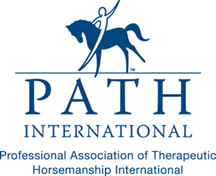|
Welcome to another edition of the STEPS Herd Member Spotlight! Today, we're delighted to feature an interview with Maggie, the matriarch of the STEPS herd. Conducting the interview is none other than our very own Bob, a charming and curious member of the herd who always brings a unique perspective to our conversations. Let's dive right in and hear Maggie's incredible story in her own words. Bob: Hi Maggie! Thanks for taking the time to chat with me today. Let's start at the beginning. Can you tell us a bit about your life before coming to STEPS? Maggie: Hi Bob! It's a pleasure to chat with you. My story began in a place I’d rather forget—a kill lot. It was December 2014 when a rescue group found me and my filly, Molly. We were both in a pretty rough spot, and I was terrified of what the future held. Bob: That sounds really scary. How did you end up getting rescued? Maggie: The rescue group managed to track down my previous owner through my papers. Molly was my first foal, and I was very protective of her. They noticed an indentation on my side where a girth would go, a sign that I had experienced some rough handling in the past. The Thomas Foundation was contacted to take Molly. When they arrived, they insisted on taking in just Molly, but also me and another orphaned filly named Candy. Bob: Wow, that must have been quite a day. I heard you gave them a bit of a chase? Maggie: [laughs] Yes, I did! Molly and Candy loaded easily, but I wasn’t so sure. I broke loose and led everyone on a merry chase around the pasture. I guess I was just too scared to face what might come next. Eventually, I realized they meant no harm and agreed to load. Bob: It's completely understandable to be cautious. So, where did you go after that? Maggie: I moved around a bit and got to know some wonderful humans who took great care of me. Eventually, Molly and Candy were adopted together by a wonderful family in Sedona in December 2020. They’re now working cow horses on thousands of acres, living their best lives. Bob: It must have been hard to be separated from Molly and Candy. Did you make any new friends at the ranch? Maggie: Absolutely, it was tough to see them go, but I’m so happy they found a good home. At the ranch, I became great friends with Sissy. We’ve been inseparable ever since. I only agreed to come to STEPS if Sissy could come with me. Bob: It's great to hear you found a close friend in Sissy. How would you describe your life now at STEPS? Maggie: Life at STEPS is peaceful and fulfilling. I get to be with my herd, enjoy the company of wonderful people, and most importantly, feel safe and loved. I’ve always been a protector, and here, I can finally let my guard down and let others take care of me too. Bob: Speaking of letting your guard down, I wanted to ask you about your work with clients who have experienced trauma and PTSD. With PTSD Awareness Month upon us, could you tell us how you help these clients through equine assisted counseling? Maggie: Absolutely, Bob. Equine assisted counseling can be incredibly beneficial for clients with PTSD. The grounding effect of interacting with us horses helps clients feel safe enough to start processing their past trauma. Horses, like us, live in the present moment. When clients spend time with us, they often find it easier to stay grounded and focus on the here and now. Bob: That makes a lot of sense. How do you think being among the herd helps clients let their guard down? Maggie: When clients are among us, they often feel accepted and understood without judgment. Our calm and gentle nature provides a sense of security, allowing them to relax and let their defenses down. It’s much like how I feel safe and loved here at STEPS. This environment helps clients begin to trust again, both in themselves and in others. Bob: That sounds really powerful. Can you talk about how clients learn to readjust to life after trauma by observing the herd? Maggie: Certainly. Horses are naturally aware of our surroundings but not overly hypervigilant. We respond to potential threats appropriately, but once we assess that we’re safe, we return to a calm state. Clients can learn a lot from observing this behavior. It shows them how to balance awareness with relaxation, helping them understand that it’s possible to feel safe without being constantly on high alert. Bob: That’s such an important lesson. What about the acceptance and empathy people feel from the herd? How does that contribute to their healing? Maggie: The acceptance and empathy they feel from us are crucial for their healing. Many clients with PTSD have experienced rejection or misunderstanding from others. Here, they find unconditional acceptance. We don’t judge their past or their pain. Instead, we offer a nonverbal connection that can be incredibly soothing and validating. This empathy helps clients feel seen and valued, which is a significant step toward healing. Bob: I know the work you do is truly transformative. How do you feel being a part of this process? Maggie: It’s incredibly fulfilling, Bob. Knowing that I can help someone find peace and start healing from their trauma is a wonderful feeling. Just as I found a safe haven here, I’m glad to be part of providing that for others. It’s a beautiful cycle of healing and connection. Bob: Thanks for sharing, Maggie. It’s clear that your work is making a big difference in the lives of many. Here’s to continuing to support and heal together, especially during PTSD Awareness Month. Maggie: Thank you, Bob. It’s been a pleasure talking with you. Here’s to our wonderful herd and the bright future ahead! Stay tuned for more heartwarming stories and interviews from our beloved herd members. Until next time, take care and cherish the bonds that make us family. During PTSD Awareness Month, you can make a difference by Donating or joining Maggie's Carrot Club! Want to work with Maggie as a client? Fill out a Counseling Interest Form!
0 Comments
Bob: Hey there, everyone! It's Bob, your favorite mini therapy horse, and today I've got a special guest joining me for an interview. Please welcome my dear herd mate, Belle! Belle: Hi, Bob! Thanks for having me. Bob: Of course, Belle! Now, let's dive into your background. I heard you've had quite the journey. Can you tell us a bit about where you came from and how you ended up here? Belle: Sure thing, Bob. My journey began when I was pulled from an Oklahoma kill lot back in December of 2014. It was a rough start, but things started looking up when I came to the Thomas Foundation Second Chance Horse Rescue with my friend Catalina. I moved around a bit before coming back to the Thomas Foundation. In late 2021, I was honored to join the STEPS herd and start my next life chapter. Bob: Wow, quite the adventure! Now, let's talk more about equine assisted counseling. You've developed a reputation for really being an expert at helping humans heal. Can you share your perspective on how it helps? Belle: Equine assisted counseling provides a safe space for clients to feel grounded and discuss stressful or upsetting experiences. Being in the presence of horses like us helps clients feel more at ease and open to exploring their emotions. Bob: That makes sense, Belle. How do you see the feedback from equines helping people to recognize their emotions and gain insight into their thoughts, feelings, and behaviors? Belle: We are incredibly sensitive animals, Bob. We can pick up on subtle cues from humans and reflect their emotions back to them. For example, if a client approaches me feeling anxious, I respond authentically to that anxiety, helping the client recognize and process their own feelings. This feedback loop fosters self-awareness and emotional insight. Bob: Interesting, Belle. Equine assisted counseling also offers opportunities for clients to practice life skills. Can you give us some examples of these skills? Belle: Absolutely, Bob. Clients have the chance to practice calming techniques, such as deep breathing and visualization, while interacting with us. They also learn important communication skills by working with us nonverbally and setting boundaries in our interactions. These skills are invaluable for managing stress and building healthy relationships. Bob: Lastly, Belle, how do you think equine assisted counseling helps clients explore patterns and parallels between their experiences with equines and their day-to-day lives? Belle: Equine assisted counseling allows clients to draw parallels between their interactions with us and their everyday experiences. For instance, if a client struggles with trust issues, they may notice similarities between their relationship with me and their relationships with others. By exploring these patterns, clients can gain insight into their behaviors and make positive changes in their lives. Bob: Thank you for sharing your insights with us, Belle. If you're inspired by our work and want to support us in helping more people, consider donating through the Seen Through Horses campaign. Your contributions go directly towards supporting Belle, myself, and our herd mates in providing healing and support to those in need. Together, we can make a difference! https://seenthroughhorses.raisely.com/t/steps-with-horses Want to work with Belle as a client? Fill out our Counseling Interest Form! Want to hear from Belle directly and become one of her biggest fans? Join Belle's Carrot Club! Bob: Good morning, Keyman! I'm excited to sit down with you today and delve into your journey and the science behind the human-horse bond. Keyman: Good morning, Bob! I'm glad to be here and share my experiences with you. Bob: Let's start with your background. I understand your real name is Karas Kiyara, meaning "the best," and you come from a remarkable lineage, with the legendary Black Stallion as your great-great-grandfather. Can you tell us a bit about your family history and how it has influenced you? Keyman: Absolutely. My lineage is something I take great pride in, as it symbolizes strength, resilience, and a deep connection to the equine world. The legacy of the Black Stallion has always inspired me to strive for greatness and forge meaningful bonds with those around me. Bob: That's truly inspiring, Keyman. Now, let's talk about your journey to STEPS. I understand you underwent some significant life changes before finding your way here. Could you share a bit about that and how you and Starbuck became such close companions? Keyman: Of course. Life has a way of throwing unexpected challenges our way, and I've certainly had my share of them. After navigating through a period of change, I found solace and purpose here at STEPS. Starbuck and I connected on a profound level from the moment we met. His unwavering support and companionship have been invaluable to me as I've navigated this new chapter of my life.  Bob: It's incredible how we as horses can provide such comfort and support during times of transition. Now, let's delve into the science behind the human-horse bond and how we use it in equine assisted counseling. We often hear about the powerful bond between humans and animals, but could you explain how this bond translates into therapeutic benefits? Keyman: Absolutely. The human-animal bond is a truly remarkable phenomenon with profound therapeutic implications. When individuals interact with animals, such as horses, their bodies can release oxytocin, often referred to as the "social connection hormone." This hormone promotes feelings of trust, relaxation, and well-being, making clients more receptive to the counseling process. Additionally, the presence of animals has been shown to reduce cortisol levels, the stress hormone, which can help alleviate anxiety and promote emotional regulation. Interacting with animals also lowers human blood pressure, improves their heart rate, and reduces their anxiety. Bob: That's fascinating. It's incredible to think about the physiological and emotional benefits that come from simply being in the presence of animals. Can you elaborate on how horses, in particular, are adept at reading and responding to human emotions? Keyman: Absolutely. We as horses are incredibly intuitive animals with a keen ability to sense and respond to human emotions. We are masters at reading their subtle cues such as body language, facial expressions, tone of voice, and even scent. This heightened sensitivity allows us to read and respond to the emotional state of our human clients, creating opportunities for profound insight and growth. By providing nonverbal feedback and validation, we enhance the therapeutic process and deepen the connection between our clients and counselors.  Bob: It's truly remarkable how we can facilitate healing in such a unique way. Well, Keyman, thank you so much for sharing your story and insights with us today. It's been a pleasure getting to learn more about the transformative power of our relationship with humans. Keyman: Thank you, Bob. It's been a pleasure sharing my experiences with you. I hope our conversation has shed light on the profound impact that we can have on our human friends’ lives and well-being Want to hear more from Keyman? Join Keyman's Carrot Club and support his care! Interested in working with Keyman as a client? Fill out a Counseling Interest Form! Bob: Hello, everyone! I'm Bob, the Human-Equine Relations Manager here at STEPS With Horses, and today I have the pleasure of interviewing none other than our esteemed herd member, Snoop! Snoop, it's an honor to have you here. Snoop: Thanks, Bob! It's great to be here and share a bit of my story with everyone. Bob: So, Snoop, I've heard that you had quite the illustrious career before joining us here at STEPS. Could you tell us a bit about your background? Snoop: Of course! Well, before I came to STEPS, I spent many years competing in the show ring. I'm a Palomino Quarter Horse born in Georgia, and my original owners affectionately called me "Snoop" because I was always on the lookout for treats, you know, snooping around! I had a successful career, even winning a World Championship in Western Pleasure. But as I got older, I started to feel like there was more to life than just ribbons and trophies. 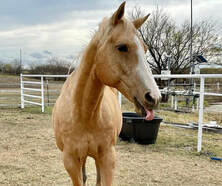 Bob: That's fascinating, Snoop. What made you decide to transition from the show ring to becoming a therapy horse? Snoop: It was a combination of factors, really. As I aged, I began to appreciate the importance of connection and empathy. I realized that my calm demeanor and gentle nature could bring comfort and healing to others. When I learned about the work that STEPS does, I knew it was the perfect fit for me. And I just really love people - sometimes event more than other horses! Bob: Can you tell us more about the STEPS Model and how it aligns with your own values? Snoop: Absolutely. The STEPS Model, which stands for Spectrum of Therapeutic Equine-Partnered Services, is a comprehensive approach to equine assisted mental health services. It's all about meeting each client where they are and providing ongoing support throughout their journey. At the core of the STEPS Model is equine assisted counseling (EAC). This phase involves licensed therapists (or therapists-in-training) and equine professionals working together to help clients address a wide range of mental health concerns. Whether it's anxiety, depression, trauma, or relationship issues, EAC provides a safe space for clients to explore and heal. And here's where I come in—I'm actively involved in EAC sessions, providing comfort, support, and a non-judgmental presence for clients as they navigate their therapeutic journey. Bob: That sounds incredibly impactful, Snoop. What happens after clients complete the counseling phase? Snoop: Once clients have met their counseling goals or made substantial progress, they have the opportunity to join the therapeutic horsemanship program. This nonclinical program focuses on learning horsemanship and riding skills in a supportive environment. Our specially trained therapeutic riding instructors ensure that every client feels safe and empowered, regardless of their mental health challenges. In the therapeutic horsemanship program, I play a different role. I become a partner in learning, helping clients develop confidence, communication skills, and a deeper understanding of horsemanship. Whether it's grooming, leading, or riding, I'm there every step of the way, offering gentle guidance and unwavering support. 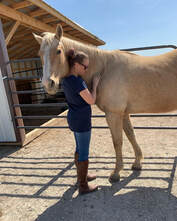 Bob: It's wonderful to hear how STEPS prioritizes the well-being of its clients every step of the way. How has your experience been since joining the STEPS herd? Snoop: It's been truly fulfilling, Bob. I love being able to connect with people on a deeper level and witness their progress firsthand. Whether it's a quiet moment of reflection in the pasture during EAC sessions or a joyful ride around the arena in the therapeutic horsemanship program, every interaction reminds me of the power of human-animal bonds. And knowing that I'm making a difference in someone's life brings me immense joy. Bob: That's fantastic, Snoop. Before we wrap up, is there anything else you'd like to share with our audience? Snoop: Absolutely, Bob. One aspect of the STEPS Model that I find particularly innovative and impactful is its provision of post-counseling support through the therapeutic horsemanship program. It's rare to find mental health services that offer such comprehensive and ongoing support beyond the counseling phase. This unique approach ensures that clients continue to receive the care and guidance they need to maintain their progress and thrive in the long term. Bob: Well said, Snoop. Thank you for highlighting that important aspect of the STEPS Model. Snoop: My pleasure, Bob. And thank you to everyone at STEPS for welcoming me with open arms. Together, we're making a real difference in the lives of our clients, one hoofbeat at a time. Bob: And there you have it, folks! Snoop, the champion-turned-therapy-horse, proving that sometimes the greatest victories are found not in the show ring, but in the hearts of those we touch. Until next time, keep spreading love and kindness, just like Snoop here at STEPS With Horses. About STEPS With Horses STEPS With Horses is a leading provider of equine assisted mental health services, dedicated to promoting healing and growth for individuals facing mental health challenges. Through a holistic approach and the power of human-animal bonds, STEPS empowers clients to overcome obstacles and thrive. To support Snoop and the STEPS With Horses herd, join Snoop’s Carrot Club! Want to work with Snoop as a client, fill out our Counseling Interest Form! Want to make a general donation, support STEPS’ participation in the national Seen Through Horses campaign Bob: Hello everyone, and welcome to today's special interview with Max, a remarkable therapy horse in our herd. Max, it's great to have you here. Max: Thank you, Bob! I'm excited to share my story with everyone. Bob: So, Max, let's start from the beginning. Can you tell us about your past as a competitive reining horse? Max: Absolutely, Bob. I had a successful career as a reining show horse, competing in Western competitions showcasing my agility, responsiveness, and precision. Reining is a western riding competition where horses perform a set pattern that includes spins, circles, stops, and sliding stops. I loved the thrill of it all. Here’s a fun fact about me - I am a registered American Quarter Horse and my real name is Legendary Slider! Max is my nickname. Bob: That sounds incredible. Unfortunately, your career was cut short due to an injury, right? Max: Yes, it was a tough time for me. I sustained an injury that prevented me from continuing in the show ring. However, that turned out to be a turning point in my life. 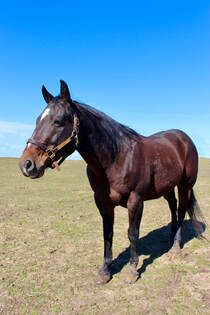 Bob: Can you share how you transitioned from a show horse to becoming a therapy horse in the STEPS program? Max: After my injury, my owners, realizing I had so much more to offer, decided to donate me to join STEPS with Horses so I could participate in STEPS’ counseling and therapeutic riding program to help individuals facing various challenges through the healing power of horses. Bob: That's wonderful. How did you initially adjust to being a therapy horse and joining the herd? Max: It was challenging at first. I was used to the spotlight of the show ring and had to learn how to get along with the other herd members. I wasn’t used to living in such close contact with other horses which made integrating into the herd tough. I struggled to understand my new role and the dynamics of being in a herd. To be honest, I wasn’t so nice to some of my other herd members. Bob: How did you overcome those challenges? Max: With time and support from my fellow herd members. I learned the importance of empathy, patience, and being attuned to the needs of those around me. Gradually, I grew into my role as a leader and now look out for everyone in the herd, both human and equine. 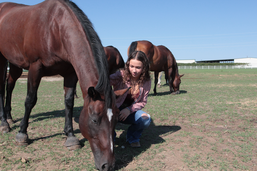 Bob: Recently, you participated in the Chisholm Challenge Horse Show as part of the Fort Worth Stock Show and Rodeo. Can you tell us more about this event and share your experience? Max: The Chisholm Challenge Horse Show is a unique event that takes place as part of the Fort Worth Stock Show and Rodeo. It's specifically designed for riders with unique challenges or disabilities. Participants get the opportunity to showcase their equestrian skills and demonstrate meaningful connections with therapy horses like me. It's an inclusive and empowering event that highlights the abilities of riders overcoming challenges. Oh, it was an amazing experience! I felt immense pride when I carried the flag during the opening ceremonies. Being part of such a prestigious event was an honor. But the real highlight was seeing my riders succeed in their events and winning ribbons. It filled my heart with joy to know I played a part in their achievements. Bob: That's truly heartwarming, Max. Your journey from a reining show horse to a therapy horse making a positive impact is inspiring. Thank you for sharing your story with us today. Max: Thank you, Bob, and thank you to everyone who supports the STEPS program. Together, we're making a difference one hoofbeat at a time. Want to support Max and hear from him more often? Join Max’s Carrot Club! Want to work with Max as a client? Fill out the Counseling Interest Form! Bob: Hello everyone, and welcome to another insightful session with our beloved therapy horses at STEPS with Horses. Today, I have the pleasure of cocking a hoof up with the wonderful Sissy, a true gem in our herd. Thank you for joining us, Sissy! Sissy: Hello, Bob! It's a pleasure to be here. Bob: Sissy, could you share a bit about your life before joining STEPS with Horses? We've heard you've had quite a journey. Sissy: Certainly, Bob. Several years ago, I was carrying a foal for a friend. Unfortunately, the foal didn't make it, and I faced some serious health challenges. I received the best care, but I was finished having babies. I later moved to the Thomas Foundation Second Chance Horse Rescue who helped me find my forever home with STEPS With Horses. My best friend, Maggie, and I moved to STEPS two years ago. We’ve made wonderful friends with the other herd members, especially my boyfriend, Max. Bob: It sounds like you've had quite the journey. Now, tell us about your friendship with Maggie and Max. What makes your bond so special? Sissy: Maggie and Max are like family to me. We're often inseparable, spending our days together. Max is the herd boss, and Maggie and I are always by his side. We share scratches, love, and of course, juicy grass. It's a special connection that brings joy to our days. Bob: That's remarkable, Sissy. The STEPS humans emphasize that our equine well-being is crucial, not just physically but emotionally. Can you tell us more about how the team cares for our herd emotionally? Sissy: The team here is amazing, Bob. They understand that our emotional well-being is just as important as our physical health. We have a comfortable and safe environment that allows us to express ourselves naturally. It's not just about being well-fed and healthy; it's about feeling content and emotionally secure. The attentiveness to our emotional needs contributes to the positive energy we bring into therapy sessions. 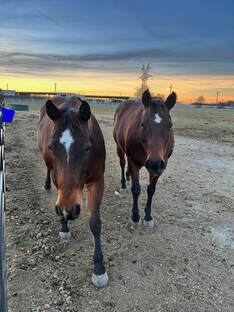 Bob: I completely agree, Sissy. Let’s go a little deeper and talk about some key elements of the humans’ counseling approach, Relational Equine-Partnered Counseling (REPC), and how it benefits our herd. One fundamental aspect is the belief in our capacity to be self-directed. In REPC, they view us not as entities to be controlled but as sentient participants in the therapeutic process. Sissy: That's right, Bob. Most of the time, we roam freely in our pastures, choosing what we want to participate in during sessions. If we feel like following a client around, we do. If we want to walk away, we do. This autonomy allows us to authentically express our reactions, creating genuine connections with our clients. Bob: I love talking about how REPC respects our autonomy, treating us as equal partners in the therapeutic relationship. Now, another distinctive element is the de-emphasis on structured activities. REPC values the development of insight and emotional regulation over completing specific exercises. How has this approach impacted your experience as a therapy horse? Sissy: Well, Bob, the organic and adaptable nature of REPC keeps our work engaging and mentally stimulating. Horses, like people, can get bored with repetitive tasks. REPC allows us to approach each session with freshness, making every day different. It's a stark contrast to more rigid equestrian activities that might become monotonous for us. Bob: That's a crucial insight, Sissy. REPC not only benefits our human clients but also contributes to our well-being as therapy horses by providing mental stimulation. Have you observed positive changes in some of your herd members since moving to STEPS? Sissy: Absolutely, Bob. I’ve really noticed positive changes in Echo and Belle, who came from the Thomas Foundation with Maggie and me. They were both pretty nervous with people, but have found their calling as therapy horses by building trust with both our human coworkers and our clients. It's a testament to the holistic impact of equine assisted counseling on all of my equine friends. 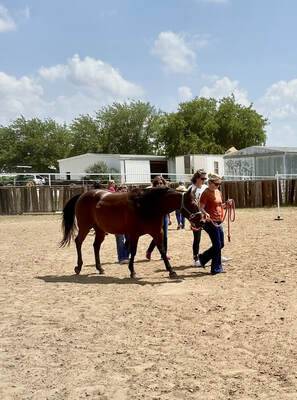 Bob: It truly sounds like a fulfilling role, Sissy. Lastly, how has being a therapy horse influenced your own well-being and happiness? Sissy: Being a therapy horse is fulfilling for me as well. It's not just about giving; it's also about receiving love and attention. The positive interactions with clients and the care from the STEPS team contribute to my overall happiness. It's a mutually enriching experience. Bob: It sounds like you've found your calling here, Sissy. We're grateful for the joy and love you bring to the STEPS herd family. Thank you for sharing your story with us. Sissy: Thank you, Bob. It's been a pleasure. And to everyone listening, come visit us at STEPS with Horses. We'd love to share some love and snuggles with you! Want to work with Sissy as a client? Fill out a Counseling Interest Form! Interested in hearing from Sissy every month and extra special gifts? Join Sissy's Carrot Club and support Sissy and her herd! Bob: Hello, everyone! I'm here today with a very special member of the STEPS with Horses herd, our esteemed miniature donkey, Donkey. Donkey, thank you for joining us today. Can you share a bit about your background and how you became the longest-standing member of the STEPS herd? Donkey: Well, hello, Bob! It's always a pleasure to chat. I've been with STEPS with Horses for quite a while now, the longest of the bunch, you could say. As you know, you and I came together from our last ranch, and I've seen this wonderful organization grow and flourish over the years. Bob: That's incredible, Donkey. Can you tell us about your role in equine assisted counseling and how long you've been working with clients? Donkey: Absolutely, Bob. I've been a part of the equine assisted counseling team for more than five years now. It's been a transformative experience for me. When I first started, I was quite scared of people – I'd run away from everyone. But through the counseling sessions, I found my purpose and calling in life. Helping clients, supporting them when they're feeling anxious or vulnerable, that's what I live for. 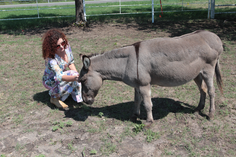 Bob: That's beautiful, Donkey. How has equine assisted counseling helped you build trust in people while also aiding your clients? Donkey: It's been quite the journey, Bob. Doing this counseling work helped me realize that people are here to support and care for me, just like I support and care for them. It's a mutual understanding that's built on trust and connection. As I've opened up to clients, I've seen them open up too. We've grown together, and it's a remarkable experience. Bob: That's truly heartwarming, Donkey. Now, I've seen that you're particularly good at picking up on when your clients are feeling anxious or vulnerable. Can you tell us more about how you show your support and protectiveness? Donkey: Absolutely, Bob. It's like I have a sixth sense for it. When clients are feeling uneasy or vulnerable, I step in front of them. It's a way of showing them that I'm here, I've got their back, and they're not alone. It's a silent communication that speaks volumes, and it's amazing to see the comfort it brings to our clients. Bob: Your empathy and support are truly commendable, Donkey. Now, I'd love for you to share with our audience about the Ride with Kendall campaign. Can you tell us more about it? Donkey: Absolutely, Bob. Kendall Hayley is an amazing human who's embarking on a motorcycle journey of a lifetime. He’s a long-distance endurance motorcyclist with over 300,000 miles logged on a Harley Davidson over the past 10 years who has been selected for the most extreme motorcycle challenge in the world, the Hoka Hey. In August 2024, Kendall will cover over 10,000 miles in 10-14 days, starting from the southern point of Key West, Florida, and finishing in Homer, Alaska. Bob: That sounds like an incredible challenge. Can you tell us more about the Hoka Hey and what makes it so unique? Donkey: Certainly, Bob. The Hoka Hey is not just a race; it's a challenge that pushes riders to their limits. It's more than a test of riding skill and endurance; it's a spiritual, mental, and physical challenge. Riders are equipped with only handwritten turn-by-turn directions, with no GPS or map navigation. They sleep outside next to their motorcycles each night. It's an event that truly challenges every aspect of a rider, from the selection process to reaching the finish line. 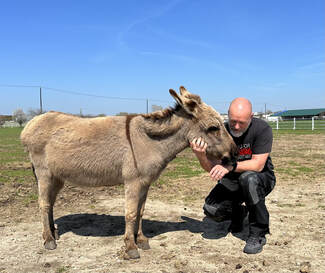 Bob: Kendall's dedication to such an extreme challenge is commendable. Why is Kendall riding for STEPS, and how does his journey connect with our mission? Donkey: Kendall's connection with STEPS' mission runs deep. As an Ordained Youth Minister, with a professional career in the death care industry, and a personal experience of losing a brother to suicide, Kendall understands the importance of mental health support. He sees the life-changing value in what STEPS with Horses does, especially for Veterans and At-Risk Teenagers. Riding for STEPS is Kendall's way of using his passion for motorcycling to raise awareness and support for an organization that directly impacts people he deeply cares for. It's a beautiful alignment of his personal experiences and his desire to make a positive difference. Bob: Thank you, Donkey, for shedding light on Kendall's incredible journey and the meaningful cause he’s riding for. It's heartening to see individuals like Kendall dedicating their efforts to support organizations like ours. Donkey: Thank you, Bob. And to everyone listening, remember, Kendall's ride is not just a motorcycle journey; it's a journey of empathy, compassion, and awareness. Let's all support his mission and make a difference together. You can even help Kendall reach his goal of raising a dollar per mile giving to https://donorbox.org/ride-with-kendall-hokahey Want to work with Donkey in counseling? Want to hear more from Donkey and support the herd?
Bob: Hello, Echo! We're excited to have you here today for this special interview. Can you share a bit about your background, particularly your journey from being a formerly wild mustang? Echo: Thank you, Bob. It's great to be here and share my story. I arrived at the Thomas Foundation in 2020, but my journey started even earlier. I was rescued by the amazing Bluestem Acres in Towanda, Kansas, back in 2017. At that time, I was a Navajo mustang, living wild, and carrying a foal. Thankfully, I was saved me from a difficult fate. I delivered a beautiful colt, who was later adopted. I came from a background where I had to be cautious, especially around new people. It's hard for me to trust quickly, given my past experiences. But once I found my way to STEPS with Horses, I began to settle nicely into the herd and started to trust my new human coworkers and clients. 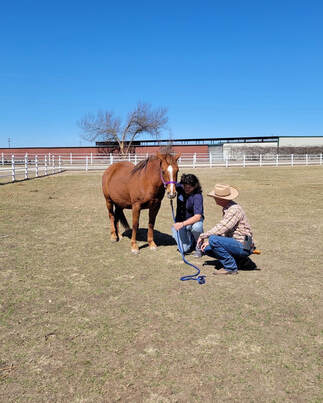 Bob: It sounds like quite the journey, Echo. Can you tell us about your friends, Maggie and Sissy, in the herd? Echo: Oh, Maggie and Sissy, we met at the Thomas Foundation and came to STEPS together. They're my partners in crime. Maggie's the wise one in the group, always keeping an eye out for everyone. Sissy is the playful and mischievous one, but we all balance each other out quite nicely. Together, we (and Max) created a little herd of our own within the bigger one. Bob: That's lovely to hear. Now, how has participating in equine assisted counseling helped you personally, Echo? Echo: Equine assisted counseling has been transformative for me. You see, I used to be quite anxious, and being in new situations or around people made me nervous. Through our sessions, I've learned to manage my anxiety. I've found that helping others helps me too, and that's been a real confidence booster. Bob: It's wonderful to hear how you've grown through this experience, Echo. Can you tell us about your special talent in recognizing and calling out clients' incongruence? Echo: Well, it's interesting, isn't it? Horses like me, we're excellent at sensing what's going on with people. If a client says one thing but their body language or emotions tell a different story (we call this incongruence), I'm not afraid to call it out. To be honest, I’m pretty direct about it. It's like I can see through the words to the heart of the matter. It's amazing how clients can benefit from this honesty, and I take pride in being able to help them find congruence within themselves. 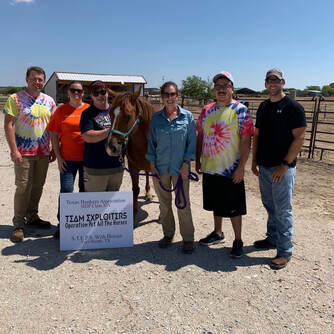 Bob: Echo, you've been sharing some incredible insights today, and I have one more question. Can you tell us about your love for doing outreach by working with groups to share the power of the human-equine relationship and equine assisted counseling? Echo: Certainly, I'd be happy to, Bob. These outreach activities are an essential part of our mission. When we host class visits, it's a wonderful opportunity for students to come and meet us, the therapy horses, and learn about the incredible bond between humans and horses. We often see their faces light up with excitement and curiosity. When volunteer groups visit us, it's heartwarming to see people from various backgrounds come together to support our mission. They help care for us, the herd, and in doing so, they become a part of our extended family. "Meet the Herd" days are a chance for the community to get up close and personal with us. These events allow people to see the magic of equine assisted counseling in action, to interact with therapy equines, and learn how we help individuals on their journey to emotional healing. Our equine assisted wellness events for other nonprofits and corporate groups are incredibly special. We get to work with a diverse range of people, from children to adults, helping them discover the power of the human-equine relationship in their own unique ways. I love helping people learn new skills - team-building, communication, self-care, leadership, and more. In all these activities, I feel proud to be a part of something bigger than myself, something that helps people understand the magic of equine-assisted counseling and how it can positively impact their lives. It's truly a remarkable experience for all involved. Bob: You have a remarkable gift, Echo. Thank you for sharing your insights with us today. You're a valued member of our therapy herd, and it's clear that you're making a meaningful impact in the lives of those you work with. Want to support Echo? Join Echo's Carrot Club! You'll receive a special gift, personalized monthly newsletters, and more! Interested in working with Echo as a client? Fill out the Counseling Interest Form! Echo would also be thrilled to host your group for a volunteer day or service or an equine assisted wellness event! Want to know more? Email us at [email protected] or call (682) 219-8733! 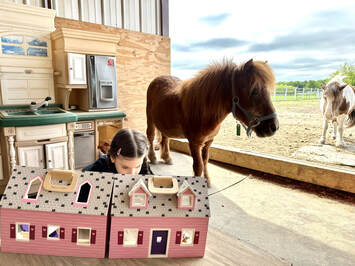 Mama Mia: Well, hello there, Bob! It's a pleasure to sit down with you today for a special interview. And thank you for allowing me the privilege to interview you! You're one of the original members of the STEPS with Horses herd, and you hold quite a prestigious title, don't you? Bob: Oh, indeed, Mama Mia! I am none other than Bob, the Official STEPS Herd Human-Equine Relations Manager. It's a position of great importance, I assure you. Mama Mia: We'll get to that, Bob. But first, let's take a stroll down memory lane. Can you tell our audience how you came to be a part of STEPS with Horses and your role in our extraordinary mission? Bob: Well, Mama Mia, it's a tale as legendary as my own name. You see, I arrived at STEPS with Horses in my late 20s, which makes me the elder statesman of the herd, a true antique of horse wisdom, if you will. Despite my age, the folks at STEPS saw the undeniable charm in my miniature stature and recognized my ability to work wonders with clients of all ages, especially the youngest humans. I became beloved by both those near and those on Zoom, and thus, I became the esteemed Official STEPS Herd Human-Equine Relations Manager, a role that I take very seriously, of course. Mama Mia: You certainly wear your responsibilities well, Bob. Now, let's talk about North Texas Giving Day. Can you explain what it is and why it's so significant for organizations like STEPS with Horses? Bob: Absolutely, Mama Mia. North Texas Giving Day is like the Super Bowl of giving. It's a day when people come together to support non-profit organizations, including ours. It's significant because it's an opportunity for our community to rally behind us, show their love, and help us continue our mission. Mama Mia: And what is that mission and how did STEPS come to be, Bob? Bob: Ah, an excellent question, Mama Mia. STEPS with Horses was co-founded by industry leader, Dr. Hallie Sheade, and USMC Veteran, Paul Ziehe, to fulfill a noble mission - to increase accessibility to counseling services for some of the most vulnerable members of our North Texas community. We're here to serve our military veterans, service members, and their families, as well as at-risk youth. But you see, we have a big heart, and we also extend our support to others with mental health needs. Their vision also included offering multiple levels of care, meeting each client exactly where they are in their journey towards healing. We believe in inclusivity, accessibility, and the power of human-equine interaction to make a positive impact in people's lives. To accomplish these goals, we use the magic of human-equine interaction to help individuals overcome challenges, find emotional healing, and develop valuable life skills. Our herd members, both human and equine, work tirelessly to create a safe and nurturing environment for our clients. 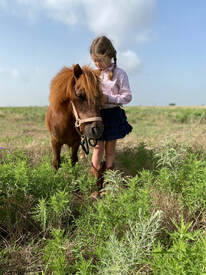 Mama Mia: That’s a great story, Bob! If the humans want to support our mission, how do donations on North Texas Giving Day impact the work you do at STEPS with Horses? Bob: Ah, the power of donations! Donations on North Texas Giving Day are like juicy green grass to hungry horses - they keep us going strong! These contributions allow us to expand our programs, reach more clients, and provide financial assistance to those who might not otherwise have access to our services. Mama Mia: Well put, Bob. Can you tell us about some of the programs and initiatives that donors can contribute to on this special day? Bob: Of course, Mama Mia. Donations raised on North Texas Giving Day support a variety of initiatives, from our play therapy sessions for children, like the ones I excel in, to programs aimed at helping teens and adults. They can also contribute to our efforts in serving individuals and families facing specific challenges like trauma, anxiety, depression, or behavioral issues. These donations also support our care like yummy alfalfa, veterinary care, and, of course, cookies! Mama Mia: And now, Bob, the final question - why do you think people should open their hearts and wallets to support STEPS with Horses on North Texas Giving Day? Bob: Mama Mia, it's quite simple. When you support STEPS with Horses, you're not just helping horses like me maintain our lavish lifestyles – you're making a genuine difference in the lives of our clients. You're enabling individuals to find healing, develop essential life skills, and discover a profound connection with the majestic creatures who make up the STEPS Herd. You're investing in the well-being of our community and helping us continue our mission of spreading love, hope, and horsiness. So, why should people support us on North Texas Giving Day? Because we're not just changing lives; we're making them better, one hoofprint at a time! Mama Mia: Well said, Bob. Thank you for sharing the heart and soul of STEPS with Horses. And to our audience, remember, your support on North Texas Giving Day makes all of this possible. So, let's come together and show some love to STEPS with Horses! Early giving is open NOW! Donate to STEPS: www.northtexasgivingday.org/stepswithhorses Bob: Hi folks! It's me, Bob, the Official STEPS Human-Equine Relations Manager and your host for today. Welcome to my show, Starbuck! We're thrilled to have the opportunity to chat with you today. Can you tell us a bit about your background as a therapy horse?
Starbuck: Thank you for having me! Well, my journey started as a dressage show horse, where I had the privilege of showcasing my skills and grace in the ring. But as time went on, I felt a calling to serve a different purpose. That's when I transitioned into becoming a therapeutic riding lesson horse for individuals with disabilities. Nowadays, I work at STEPS With Horses in Fort Worth, Texas as both a counseling partner and therapeutic riding partner for individuals with mental health challenges. Bob: That's remarkable, Starbuck. How old are you, and can you share your breed with us? Starbuck: I'm currently 24 years old, and I'm a Shire/Thoroughbred cross. My mixed heritage gives me a unique combination of strength and agility, which comes in handy during my therapeutic riding lessons. Bob: It's fascinating to hear about your background. Can you tell us about your best friend in the herd and your relationship with them? Starbuck: Ah, my best friend in the herd is Keyman. We have quite a special bond, even though we occasionally bicker like old friends do. We have our differences, but deep down, we can't be without each other. Keyman keeps me grounded and reminds me of the importance of friendship and companionship. Bob: That sounds like a wonderful connection. Now, let's talk about your experience in equine assisted counseling. How has it helped you learn to trust people again? Starbuck: Participating in equine assisted counseling has been a transformative experience for me. I had encountered some challenging situations in the past that made me skeptical of human intentions. Through this therapy, I've had the opportunity to work closely with caring and compassionate clients who have helped me rebuild my trust in people. It's been a journey of healing and rediscovery. Bob: That's truly inspiring, Starbuck. Your resilience shines through. Can you share your special talent in helping clients feel safe and overcome their fears. Starbuck: Certainly! One of my special talents is creating a safe space for clients to express themselves and grow. Many individuals who come to the sessions may have fears or anxieties, but through our interactions, I can sense their emotions and provide a calming presence. I have a way of connecting with them, allowing them to feel safe enough to face their fears and embark on a path of personal growth. It's incredibly rewarding to witness their progress. Bob: Absolutely, Starbuck. Before we conclude, we'd love to know from your perspective as a therapy horse, what is the most important thing you want people to know about equine assisted counseling? Starbuck: That's a great question. The most important thing I want people to know about equine assisted counseling is that it's not about riding horses or just being around animals. It's a powerful and effective form of therapy that can bring about profound emotional and psychological healing. Horses, like me, have an innate ability to sense and respond to human emotions without judgment. In these sessions, we become partners in the healing process, offering support, trust, and a safe space for clients to explore their feelings and overcome challenges. Bob: It's evident that you play a vital role in the therapeutic process, Starbuck. Thank you for sharing your remarkable journey with us today. Your dedication and compassion are truly inspiring. Starbuck: Thank you for giving me this opportunity to share my story. It's an honor to be part of such a meaningful endeavor. I look forward to continuing to help clients on their healing journeys and making a positive impact in their lives. Want to support Starbuck? Join Starbuck's Carrot Club! You'll receive a special gift, personalized monthly newsletters, and more! Interested in working with Starbuck as a client? Fill out the Counseling Interest Form! |
AuthorSTEPS With Horses Archives
June 2024
Categories
All
|
Let's stay in touch!
Mailing AddressP.O. Box 123737
Fort Worth, TX 76121 |
Telephone |
|
A Texas Nonprofit Corporation and a 501(c)(3) Tax-Exempt Charitable Organization
Copyright 2024 S.T.E.P.S. With Horses







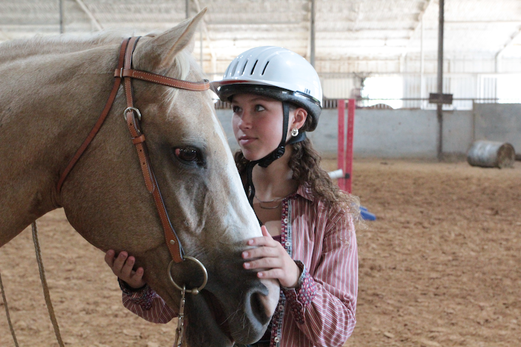
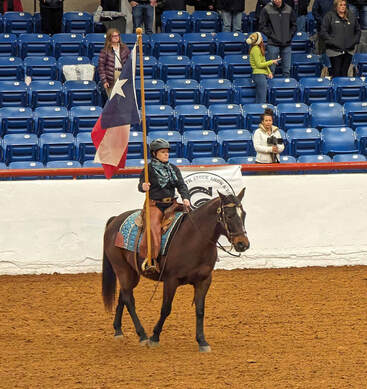
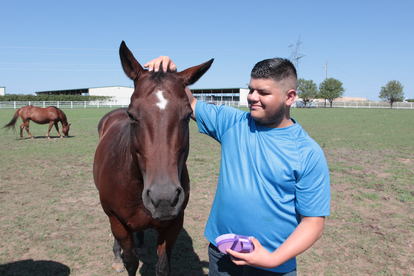
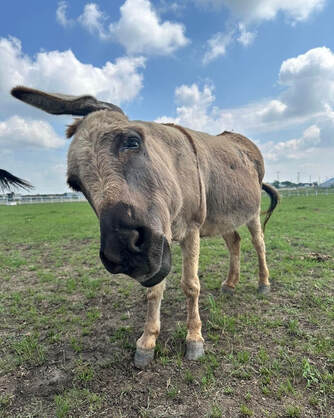
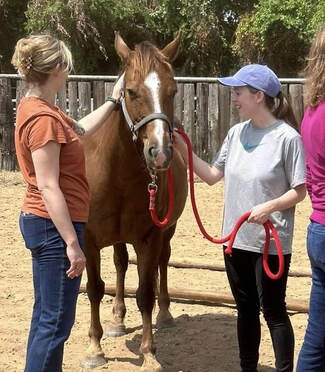
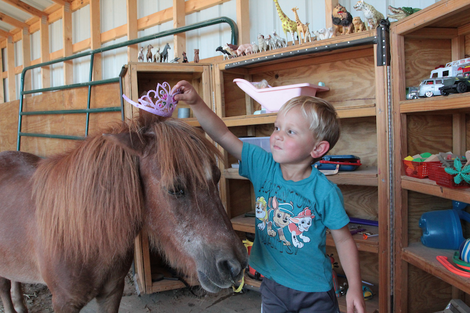
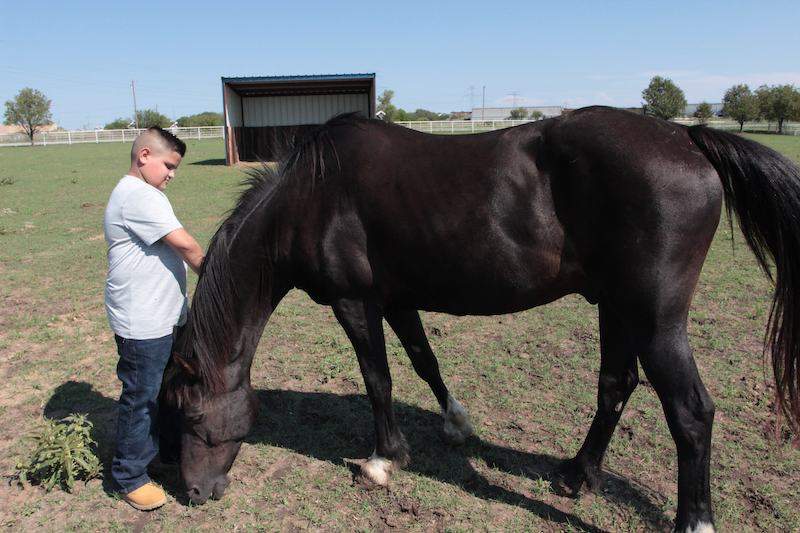
 RSS Feed
RSS Feed
